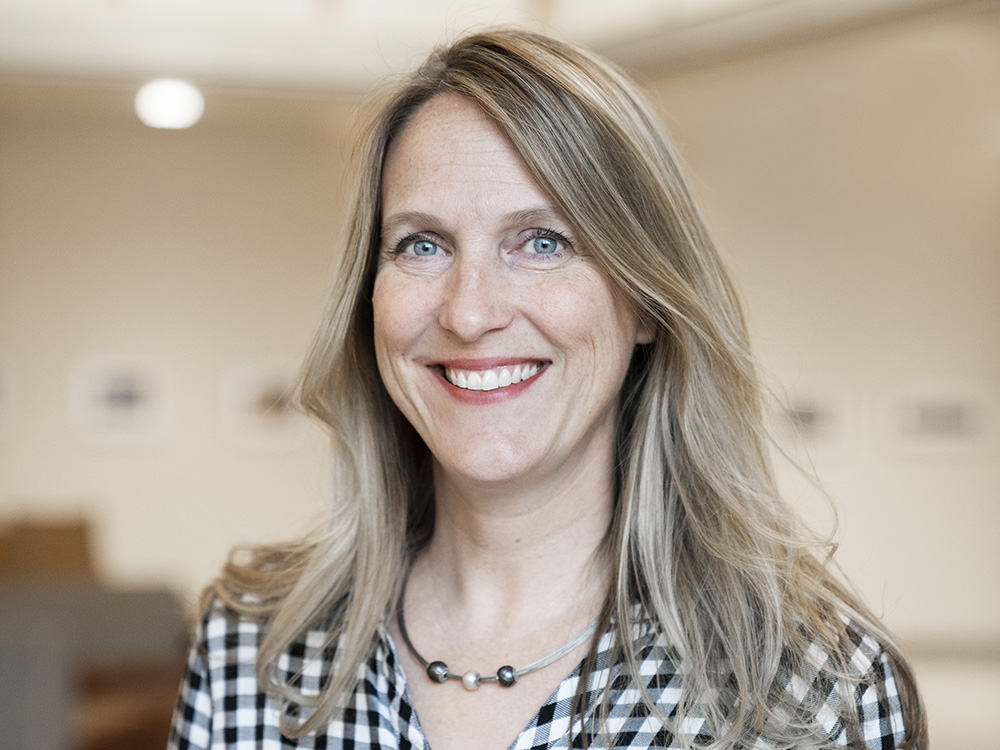
For Komen Scholar Alana Welm, Ph.D., researching metastatic breast cancer (MBC) is the greatest unmet medical need in breast cancer treatment today. Once breast cancer has metastasized (spread) to other parts of the body, MBC is currently a terminal diagnosis.
A three-year, $600,000 grant from Susan G. Komen will allow her to pursue “transformational” research on boosting the immune response to metastatic tumors at the University of Utah’s Huntsman Cancer Institute. The grant was funded in part thanks to $265,000 raised during Komen’s MBC Week fundraising campaign in October 2021.
“Once metastatic tumors are in the lungs or the bones or liver, we are working to inhibit a pathway that will make the immune system more active. Our funded research is really investigating how this pathway works. Once we better understand how it works, that will help us decide how to use these inhibitors as new therapies to target metastatic tumors,” Dr. Welm said.
“I think the importance of funding research is to allow these new discoveries to take place and then even more importantly to translate those discoveries into the clinic, which is a really tough challenge.”
While Dr. Welm doesn’t have a family history of breast cancer, her team of researchers at Huntsman became interested in researching the disease because it presents several unanswered scientific questions, from understanding the basic biology of breast cancer to figuring out why some treatments work better than others.
“It’s such a common disease that so many people suffer from with a lot of open scientific questions surrounding treatments that I thought we would want to pursue,” Dr. Welm said. “As we got further and further into the research, we’d start to meet patients. We’d start to see how our work might have a greater impact. That continues to motivate me as we move forward.”
Dr. Welm’s grant-funded research takes a two-pronged approach to studying MBC, both from a perspective of discovery science and through studying patient tumors in the lab.
“In a discovery, we’re really trying to understand how the disease grows in different parts of the body. We’re focusing on the disease in the bones and lungs. In particular, we’re really interested in how the immune system controls whether or not those tumors can grow. We’re trying to find ways that we can augment the immune response in order to eliminate those tumors,” Dr. Welm said.
“The other way that our work is impacting this disease is in studying patient tumors. We actually collect tumors from patients as they’re diagnosed in our hospital, and then we grow them in the lab as a personalized model of that person’s tumor. We test drugs in clinical trials so that we can try to find a way to personalize the therapy for individual patients.”
When Dr. Welm first began studying breast cancer, she never imagined her research would one day reach the point of being utilized in clinical trials for patients. Huntsman now has two open clinical trials for MBC patients based on her work, and the Komen grant aims to launch additional clinical trials.
“Clinical trials are really key because it’s the only way we can really test new treatments in the human patient population,” Dr. Welm said. “We have great preclinical models, and we use them all the time, but in the end, it’s not being tested on people, and that’s really the importance of trials.”
Dr. Welm’s team at Huntsman averages about 20 people in the lab at any one time, ranging from students working on their Ph.D. degrees to senior scientists who are developing models from patients, screening new drugs for patients and managing clinical trials.
“We want to find better therapies for MBC, but the other way that our research contributes to improving patient outcomes is by trying to personalize therapies in a way that would make the therapy choice less of a trial and error for the patient,” Dr. Welm said. “In this way, we could avoid giving therapies that have toxicities and won’t have a benefit for patients, and instead choose therapies that would be more beneficial.”
Dr. Welm believes the collaborative approach of bringing the patient voice into the lab is critical in driving breakthrough MBC research.
“Even though not even a fraction of our patients are scientists themselves, they’ve experienced the disease and they understand the questions, and they bring that sort of personal experience to help us make our science better,” Dr. Welm said. “It really helps motivate us because everything we do is, in the end, for patients.”
Dr. Welm is grateful for Komen’s support in funding her team’s research and all who donated to make the grant a reality.
“It is important to continue to give to research because we always have more to do – that’s the bottom line. We’re not where we need to be, and we cannot get there unless we do this discovery science, and we cannot do discovery science unless we have funds to do it,” Dr. Welm said. “It’s really the power of taking what is the unknown now and helping to benefit future generations.”
Findings from clinical trials determine whether or not new treatments will become a part of the standard of care for MBC. Learn more about clinical trials for people with MBC.



